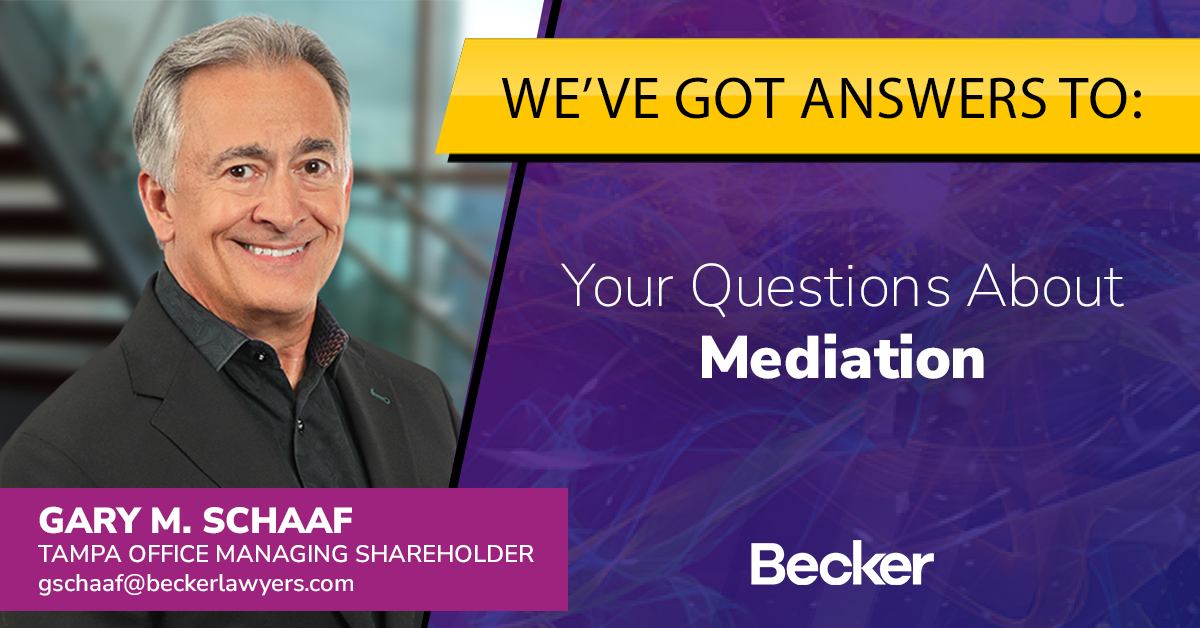We’ve Got Answers: Your Questions About Mediation Part Six

Q: What happens at mediation?
A: As I’ve explained in previous articles, a mediation is essentially a formal settlement conference. While mediations used to take place in law offices or mediators’ offices or sometimes in the courthouse (and many times still do), they now often take place by Zoom teleconference.
Typically, the mediation will begin in a conference room (or in a Zoom conference) with all of the parties together. While this nearly always used to be the case, more and more mediators are choosing to meet with the parties individually before putting them in a room together. This is particularly true in cases experiencing a particularly contentious relationship between the parties.
It should be kept in mind that it’s the mediator’s job to facilitate a settlement and if putting the parties in the same room could serve to drive them farther apart, that would be counterproductive.
In the typical initial conference at which all parties are present, known as the joint session, the mediator will begin by explaining the process and going over his or her responsibilities. Once that task is completed, the mediator will ask the attorneys to present their opening statements, usually beginning with the plaintiff’s attorney. This is one of the few opportunities in the litigation for the lawyers for each side to speak directly to their opposing parties. The opening statements can range from a simple five-minute oral presentation to a longer presentation, which may include photographs, videos, or other exhibits.
Once the opening statements are completed, the mediator may have some questions for the lawyers or the parties, although that is usually kept to a minimum. The mediator needs to be careful when asking questions in the joint session, since a party’s answer could inadvertently reveal facts and circumstances which could serve to drive the parties further apart, making the mediator’s job much harder.
In the next phase of the mediation, the mediator will separate the parties into caucuses or breakout sessions. The majority of the work gets done in these sessions, as the mediator meets with the parties and their counsel separately and engages in frank discussions outside of the hearing of the opposing party. The parties will make clear to the mediator what information, if any, may be divulged to the opposing party.
Based upon what the mediator learns in those caucuses, including any settlement offers, the mediator will engage in a sort of “shuttle diplomacy,” moving between the parties and asking questions, providing information, and exchanging any settlement offers.
The ultimate goal of the mediation is obviously to settle the case. To this end, the mediator attempts to facilitate a settlement by helping the parties move closer together in their settlement offers until they are close enough to reach an agreement. One of the primary benefits of mediation is that since the settlement terms are crafted by the parties, and not the court, they may include terms and compromises which are often not available to the court, which can typically provide only “black and white” rulings.
As an added benefit, the parties’ exchange of information often serves a discovery function which can help move the litigation along in the event that the case can’t be settled.
Ultimately, either the parties reach an agreement, which must be reduced to writing and signed by the parties if it’s going to be enforced, or the parties reach what is called an “impasse”, which means that a settlement could not be reached. Either way, the mediator will file a report with the court which discloses the outcome of the mediation. As I’ve discussed in prior articles, other than a written, signed settlement agreement, all discussions held in the mediation remain confidential.
Gary Schaaf has been a Florida Supreme Court Certified Circuit Court Mediator since 1995. He can be reached for scheduling at gschaaf@beckerlawyers.com or by phone at (813) 527-3912, and you can read more about his background here.





